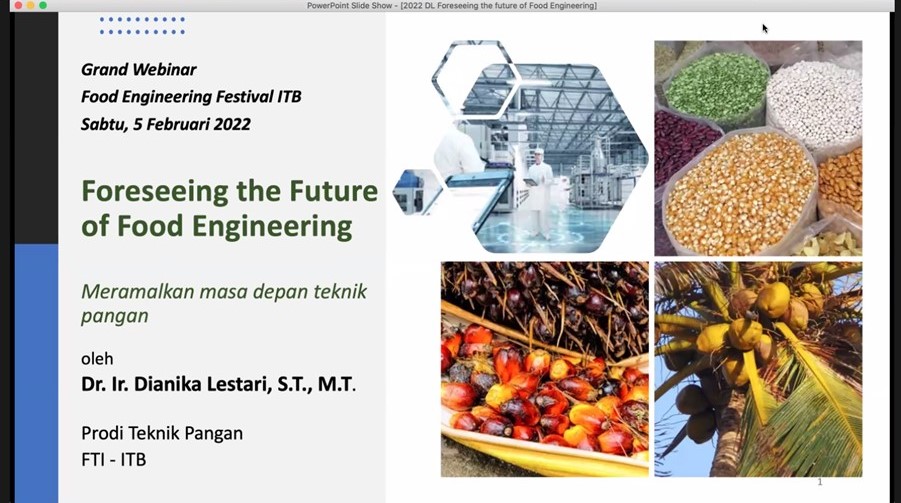BANDUNG, itb.ac.id – Himpunan Mahasiswa Teknik Pangan Institut Teknologi Bandung (HMPG ITB) held a webinar on food engineering on Saturday (5/2/2022). As one of a series of events from the Food Engineering Festival (FEF ITB), this activity has the title of “Foreseeing The Future of Food Engineering” and was brought by Dr. Ir. Dianika Lestari, S.T., M.T.
This Food Engineering ITB lecturer started her presentation about the role of food engineers, namely in designing and developing technology and systems for the production, distribution, storage of agricultural products and food ingredients on a commercial scale. “Food engineers also play a role in finding solutions to problems in food processing on an industrial scale,” explained Dr. Dianika.

Of course, to perform these various tasks, food engineers are not alone. There are various aspects that food engineers must understand. Starting from food commodities where food engineers will work closely with agricultural engineers and post-harvest engineering engineers.
Then food engineers must also understand food additives and food ingredients to produce safe and good food products, which can then be distributed to the consumers in the market.
Currently, of course, there are still some problems in the food sector in Indonesia. First, the use of Indonesian food raw materials for food components or ingredients is still limited. In addition, Indonesian process engineers are still limited in designing food production process technology to process local Indonesian food raw materials in a sustainable manner.
Therefore, food engineers from the Food Engineering study program have various tasks and roles for the future of Indonesian food. First, Indonesian food engineers must be able to create new technologies to exploit the potential of Indonesia’s food resources. This is certainly something that must be realized immediately because Indonesia has a lot of potential food resources that are rich in nutritional content that can be commercialized and also developed to help the economy, prosper the community, and advance the Indonesian state.

Second, the quality of the food produced must be very carefully considered and also maintained very well because food ingredients are sensitive materials and are in direct contact with humans completely. “Food products must be maintained for their continuity, quality, and capacity so that they can be accepted by the industry,” said Dianika.
Healthy and delicious food should be the goal of assembling future food processing technology. The production of healthy food on a commercial industrial scale will make it more affordable for the wider community.
On the other hand, engineers from Food Engineering and ITB in general have also contributed to producing various future food processing technologies for Indonesia. The results created are Closed Circulated Batch Reactor and Closed Circulated Semi-Continuous Reactor. Both of these reactors have various advantages. Starting from more efficient water consumption, better hygiene control, and a larger load of materials to be processed.

The second problem that food engineers must also solve is food waste, which is now a big problem all over the world. On a national scale, the estimated total food loss or food waste in Indonesia is 18 to 31 million tons per year. Of course, this is an urgent condition for improvement. The solution currently being developed by food engineers is technology for processing dried fruit and further processing food waste into materials that can be used for other things.
“Not only that, food engineers must also be able to improve the existing technology to become more efficient and resource-efficient technology,” explained Dianika.
In addition, Dianika continued, food engineers must also adapt and be able to keep up with the times, especially in Industry 4.0 which is rife with industrial automation, especially in the food processing, food packaging, and food servicing sectors, which are now mostly run by machines and technology.
Reporter : Yoel Enrico Meiliano (Food Engineering, 2020)

